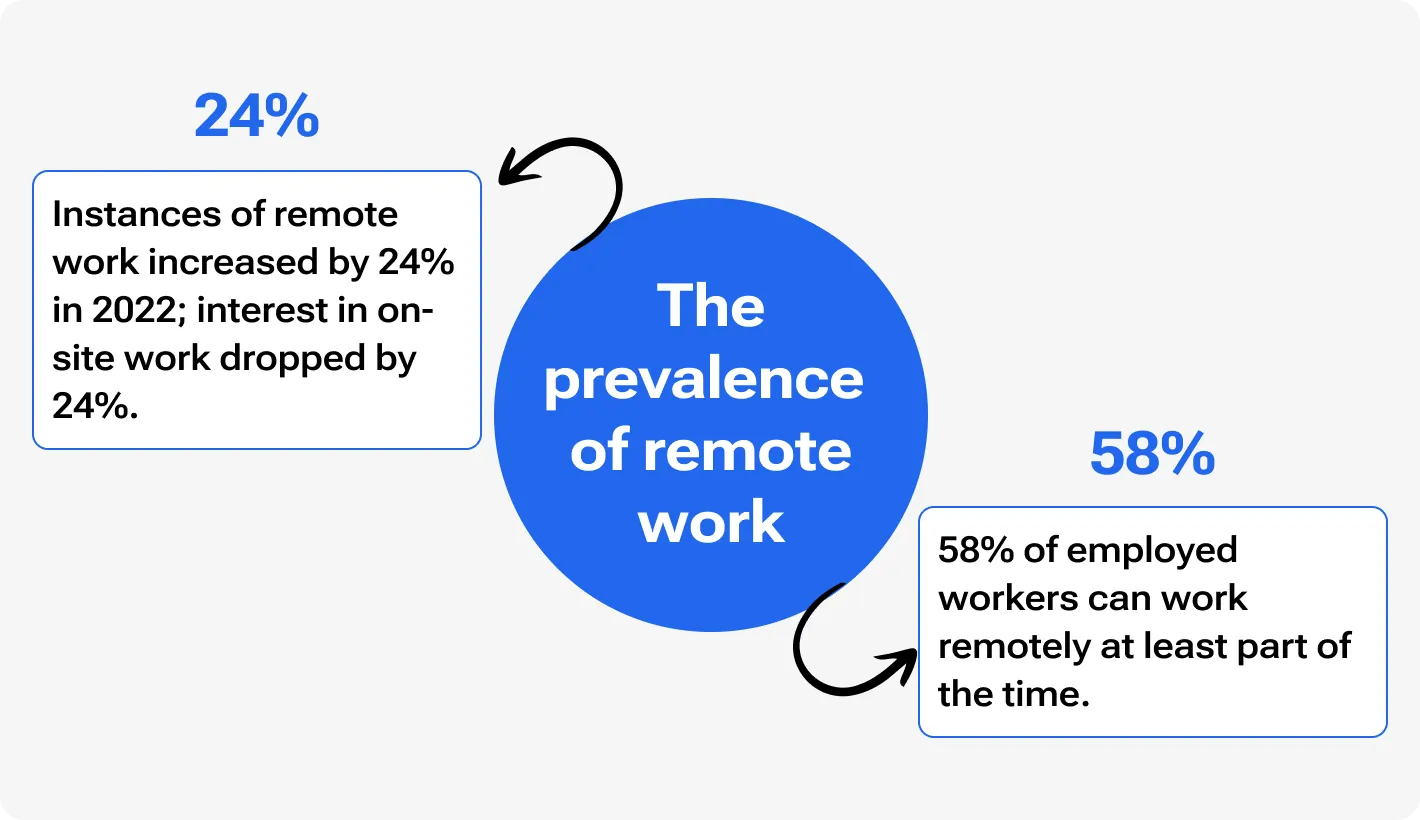Did you know of oil and gas service company Holland Services? We have a brief yet cautionary story about them. The company misclassified 700 employees in 2021… and got almost USD 43,277,000 in back wages and damages. Why? Local laws.
Now, imagine the American office of a global company failed to recognize the importance of hierarchical respect in South Korean culture. The American manager's informal approach can cause a breakdown in professionalism and discipline. This misstep is just an example of the critical need for cultural awareness in international operations.
And such a situation is gaining ground since more and more companies are expanding into new markets. Deel’s report reveals that US and other North American companies doubled their hiring from Latin America, Asia, Europe, and the Middle East, and this number has skyrocketed during the last three years.
Nevertheless, navigating the complexities of hiring across borders presents significant challenges. Businesses must deal with intricate regulations, cultural differences, and the logistical hurdles of managing a dispersed workforce.
This is the best moment to explain what an employer of record is. EORs are based on a special cooperation model and allow hiring internationally without getting entangled in the legal complexities of foreign labor laws. This way, EOR employment enables companies to focus on their core business activities and strategic growth.
Before you go all-in on global hiring, let's break down everything you need to know about EORs. We don’t pretend to have an exhaustive answer since there are always a lot of nuances. Yet, with this information, you can make smart decisions about your global expansion strategy and avoid nasty HR headaches.
Do you need to quickly hire global IT talent, but setting up a legal entity abroad is costly, complex, and could impact your tax status?
Understanding the EOR model
We know going global with your team can be a double-edged sword. On one hand, it opens doors to incredible talent. Yet, international hiring regulations can make your head spin, on the other hand.
That's where employer of record (EOR) services come in. We’re all keeping up with AIs, LLMs, and co-pilots. So, employer records are like your business's co-pilots. They help to decipher a spaghetti code of international labor laws, while you focus on the main processes — steering the core activities of your business.
The main principle of how an employer of record work can also be likened to a backstage manager in a theater, handling all the details behind the curtains and ensuring the show (your business operations) goes smoothly.
The EOR model is gaining ground, especially with the rise of remote work. Owl Labs found that 73% of full-time workers in the US want the flexibility to continue working remotely post-pandemic. By the way, 23% of those who changed the company did so because of work conditions.
We are gradually gaining a golden rule: talented people want to work remotely. EORs offer a smooth way to tap into this pool of talents without getting bogged down in international employment complexities.
Benefits-drawbacks analysis
Compliance: You don’t have to decipher complex international labor laws. Your EOR handles everything, ensuring your remote team is compliant and you avoid hefty fines.
EOR fees: There are associated fees with using an EOR service, so factor that into your budget.
Focus: You don’t waste time on paperwork and HR procedures. Just focus on building your dream team and scaling your business.
Less control (just a fear): Some companies worry about losing control over their remote team with an EOR. However, you maintain control over the work itself and company culture.
Reduced costs: An EOR can potentially save you money on things like payroll processing, taxes, and benefits administration.
Dependency: In some way, you depend on EOR’s service and decisions. But everything comes down to trust: if you partner with a trusted company, everything will go smoothly.
Faster hiring: The EOR takes care of the legal stuff, so you can onboard new talent quickly and efficiently.
In a nutshell, EORs are a game-changer for businesses looking to build a global team. They offer a compliant way to hire talent from anywhere in the world fast.
Key considerations for EOR implementation
Before going for an employer of record contract, let’s clarify the fee structures and the ways to maintain control over your workforce.
EOR fee models
EORs typically use various pricing models, including flat fees or percentage-based fees. It's essential to understand whether the employer of record services has a clear, transparent pricing structure that aligns with your financial planning needs. If you hem and haw about the pricing model, chances are a hybrid one will suit you. Yet, you’d better know the nuances of each of them.
-
Flat fee: Some EORs charge a fixed monthly fee per employee, regardless of their salary. This can be a good option for businesses with predictable hiring needs and similar salary ranges.
-
Percentage-based fee: In some cases, they charge a percentage of the EOR employees' salary. This can be more cost-effective for companies with a mix of high and low earners.
-
Hybrid model: Just a mix of flat fees and percentage-based charges.
No matter the structure, make sure the EOR clearly outlines all their fees upfront. There should be no hidden surprises come billing time.
Balancing EOR processes and control
EORs handle the legal and administrative aspects of employment. For this reason, businesses often worry about losing control over the management and culture of their workforce. Especially, this hits cultural aspects. On the one hand, you can utilize tools like Myculture.ai for the culture assessment. On the other, this doesn’t guarantee a perfect match.
To maintain the balance, choose an EOR that allows for collaborative processes in employee management so that you retain control over day-to-day employee activities and cultural integration.
Selecting an EOR partner
As we said above, you could do with some “check-ups”: cultural, technical, etc. These key factors should guide your choice:
Experience: Your potential partner must have a proven track record in your industry.
Global reach: Ensure the EOR can support your needs in all target locations, with robust local knowledge.
Service offerings: Beyond basic compliance and employer of record payrolling, some providers offer additional services like talent acquisition support, visa and immigration assistance, and employee insurance plans.
Client testimonials: Probably, the most relevant and important point — get client feedback. We suggest conducting a reference check beyond typical review testimonials on the EOR’s website. This move will provide insights into the EOR’s reliability and customer service quality.
Dive deeper into the details on how to effectively integrate an EOR into your business operations
Make sure to size up these considerations carefully to choose the best EOR solution for your needs.
The EOR on the wave of global talent acquisition
The talent landscape is undergoing a seismic shift — a bit pathetic, yet truthful. Despite many global companies forcing their employees back to the offices, remote work is a more “real reality” than any before. The Virtual Vocations study states that almost 92M Americans can work remotely at least several days a week.
Many other reports (Gartner’s, for instance) second that. And this trend coincides with the rising demand for a global talent pool. Companies are not limited by geography in their search for the best and brightest. Nonetheless, there are some challenges in hiring and managing cross-cultural teams across different continents.
Remote work is a new black
Employer of Record (EOR) model is becoming a strategic weapon for businesses navigating the global talent landscape. This trend is not only reshaping where and how work is performed but also the strategies companies use to manage their international workforce.
Employer record is a strategic response, enabling companies to employ overseas staff quickly and in compliance with local laws. By the way, the National Association of Professional Employer Organizations (NAPEO) found that NAPEO member companies grew 10% faster and had a lower employee turnover by 14%. These statistics of popularity reflect the numerous EORs’ leg-ups.
EORs’ advantages and disadvantages
Let’s face it: There are many more advantages to using EOR employment than potential pitfalls. For companies looking to enter new markets swiftly, EORs can significantly cut down the time and expense associated with establishing local corporate presences. If we take an average entity setup in Spain, the costs could reach USD 120,000.
Meanwhile, EORs manage all aspects of employment compliance, from payroll to taxation and beyond, which is particularly advantageous in regions like Germany. Yet, we can’t help but admit, this move can also pose challenges. Data security, issues of employee engagement, possible dilution of company culture — you’ll probably also encounter some of these problems. Or not. Anyway, it’s better to be aware of them.
EOR’s pros
Cut through the red tape and onboard new talent quickly without the need to set up a legal entity in each new country.
EORs can save you money on things like payroll processing, taxes, and benefits administration.
Avoid the complexities of international employment laws.
Easily scale your team up or down as your business needs evolve.
EOR’s cons
Basically, an EOR service's rising cost is the most frequently cited “flaw”, so factor that into your budget.
Some might worry about a perceived loss of control over remote employees. In fact, it's a baseless concern. You still maintain control over the work itself and the company’s culture.
The EOR model can be particularly beneficial for:
Businesses in high-growth phases: Quickly scaling the teams to meet exploding demand without the burden of setting up legal entities in new markets.
Companies with short-term projects: Easily bringing on specialized talent for temporary projects without long-term HR commitments.
Organizations targeting niche talent: Tapping into a global talent pool to find the perfect fit for specific skill sets in any location worldwide.
Take a look at an example
In June 2015, FedEx faced the most substantial misclassification case to date. That “adventure” resulted in a settlement of USD 228 million. Over 2,300 Californian drivers had been classified and paid as independent contractors, despite some claims dating back to 2000.
According to the prosecuting attorney for the FedEx case, "The USD 228 million settlement sends a powerful message to employers in California and elsewhere that the cost of independent contractor misclassification can be financially punishing, if not catastrophic, to a business."
This matter was one of 28 cases filed in multi-state litigation against FedEx for allegedly misclassifying its drivers as independent contractors. By the end of 2016, FedEx had paid nearly USD 500 million in misclassification settlement payments. Such a perfect example for understanding the importance of navigating local lawsuits.
To sum it up
Employer of Record services streamline the complexities of hiring internationally, offering compliance with local labor laws, managing payroll, and handling HR tasks efficiently. For instance, companies like Horizons have facilitated rapid market entries, exemplified by their successful integration of a tech company into the German market.
All the complexities of international employment can be a nightmare or a chance for growth. It’s a matter of your personal choice. Anyway, EOR offers a plethora of benefits.
Faster time-to-hire: This method significantly reduces onboarding times compared to traditional methods.
Reduced costs: Employer record saves money on payroll processing, taxes, and benefits administration compared to setting up legal entities abroad.
Compliance issues: Legal risks associated with navigating international employment laws are inevitable in this case. EOR mitigates them and overcomes if any rises.
Scalability: If your business grows, so does your team. And EOR manages all the associated issues.
Chances are the EOR employment is likely to expand further. Innovations in technology and integration methods are expected to enhance the scalability and efficiency of EOR services.
Want to know how your business may benefit from EOR?




